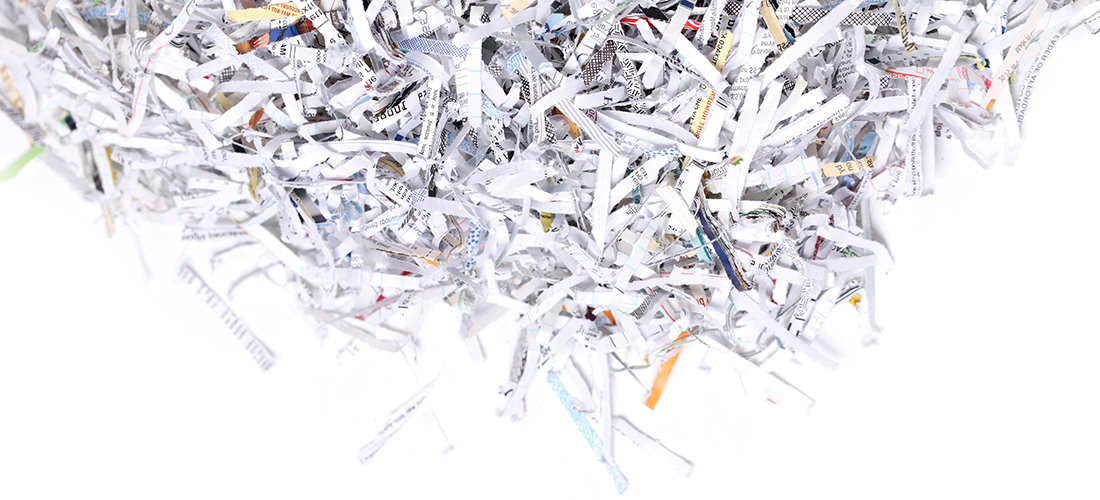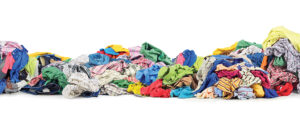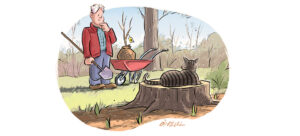
Paper Chase
The joys of springtime shredding return
By Maria Johnson
My heart leapt in my chest.
There, on my laptop screen, was a solid sign that the pre-pandemic pleasures of life were returning.
Shredding events were back.
Yee-ha!
In case you’ve had your head stuck in a pile of papers, shredding events are community gatherings that involve long lines of cars dropping off loads of personal documents at designated sites, where boxy trucks with huge metal teeth grind them to ribbons — grrrunch, grrrunch, grrrunch — in front of your very eyes.
It’s a contemporary phenomenon, this voluntary destruction of docs, and it usually happens on Saturdays, which adds to the going-to-the-fair feeling.
For your viewing pleasure, some shredding trucks are outfitted with screens showing live feeds from cameras focused on the churning blades and the mountain of pulp inside the truck.
“People like looking at their stuff getting shredded. They really like that,” says 33-year-old Jorge Acosta, who drives for a company called Shred Ace Inc. “It’s a peace of mind thing. I get it. Once those documents go in, they’re not coming out.”
That’s comforting in an age when almost everyone knows what it means to be hacked, breached or compromised.
Bottom line: Public shredding is one of the most cathartic, satisfying experiences I’ve ever had, so much so that I’m willing to overlook my disdain for the word “event,” as in “weather event” (tornado) or “cardiac event” (heart attack).
Every spring — peak season, as any master shredder knows — I schlep old records to an advertised event, where I feel a deep kinship with other defenders of the PIN.
That’s one reason 2020 was small-T traumatic for me.
Not only did COVID inflict true suffering on millions, it cancelled public shreddings far and wide for two years.
Sniff-sniff. I missed myyyyyyy evennnnnnnnnnts.
So imagine my joy when mass shredding resumed this spring. Finally, the mountain of old files that kept me from reconfiguring the closet in my office could be cleared.
Now, the hard work — weighing what to keep and what to shred — began.
Some of them were no-brainers.
Paycheck stubs, expense reports and tax returns more than a few years old? Gone.
Receipts from ancient purchases and routine medical appointments? Outta here.
Statements from accounts closed long ago? Sayonara, suckers.
Other papers, that stirred memories, were harder to part with.
A tattered file marked “Furniture” stopped me.
I leafed through receipts and notes about pieces my husband and I bought when we first started housekeeping 30-plus years ago.
I smiled at copies of letters — typed on a chunky computer monitor, spat out of a dot-matrix printer and mailed with a stamp — that I’d sent to a furniture retailer, insisting that they replace our brand new (cracked) dining room chairs with a new batch after their attempted repairs on the first set of chairs failed.
Lord, I was feisty. And probably over the top. But effective. My grandmother had given us money to buy that dining room furniture, and I was going to make her gift right.
She’s been gone for 25 years now, but when I thought about how much she liked that furniture, and how proud she was to have had a hand in making our home, she was with me again.
I kept the letters and pitched the receipts.
My husband got into the game, combing through files stuffed with his college course work. He kept a few tests marked “100.”
We joked that we should start a new file called “Damn, I Was Good.”
And maybe another one called, “Damn, That Was Stupid,” which we’d fill with evidence of the investments we’d sold right before they took off. Expensive lessons in patience, indeed.
We loaded the car with boxes and bags of old files and headed to the event. My pulse quickened when I saw a line of cars backed out onto the street, like a queue of concert-goers waiting to get into the venue.
Doubt crept in. What if we were throwing away something we’d need later? I crawled into the backseat and started pulling files. Then I said to heck with it. There probably was a mistake, a future regret, in there somewhere. So be it.
Half an hour later, we forked over a donation of $5 per box — some organizations use shredding events as fundraisers — and pulled up beside the hungry truck. Volunteers emptied our boxes into a huge plastic trash bin and rolled it to the truck.
We watched as mechanical arms clasped, raised and tipped the bin into the shredder.
Grrrunch, grrrunch, grrrunch.
Gone for good. Ashes to ashes. Pulp to pulp.
It’s the best show in town. On paper, anyway. OH
Maria Johnson is a contributing editor of O.Henry magazine. You can reach her at ohenrymaria@gmail.com.





